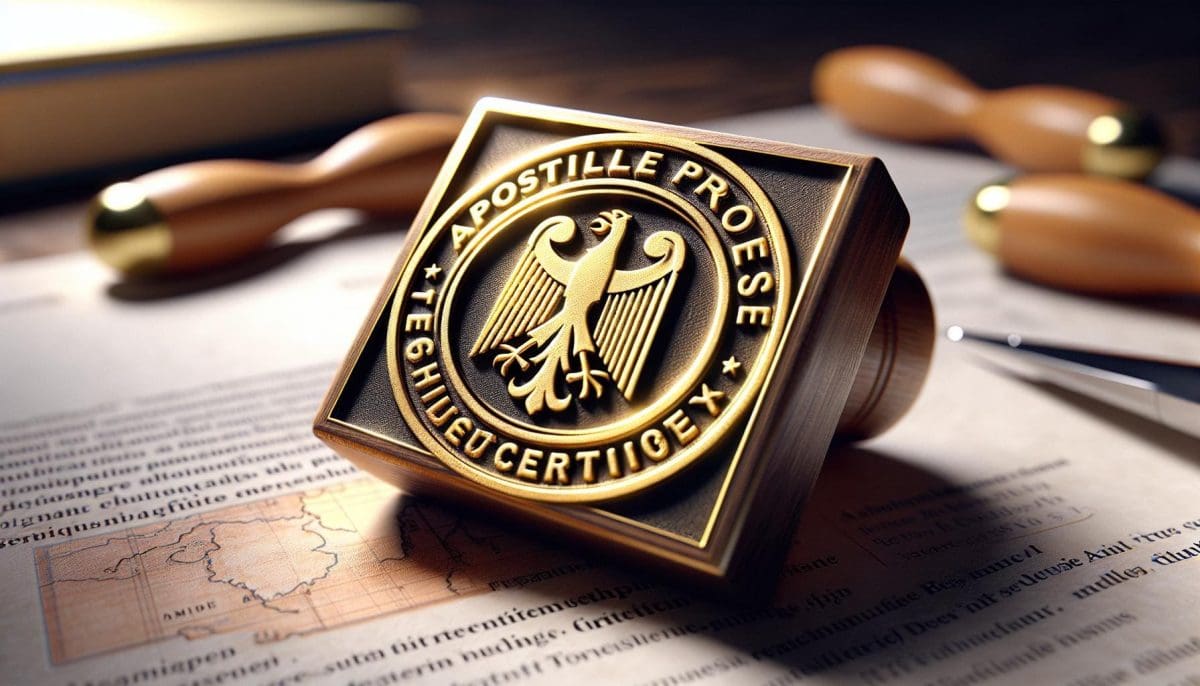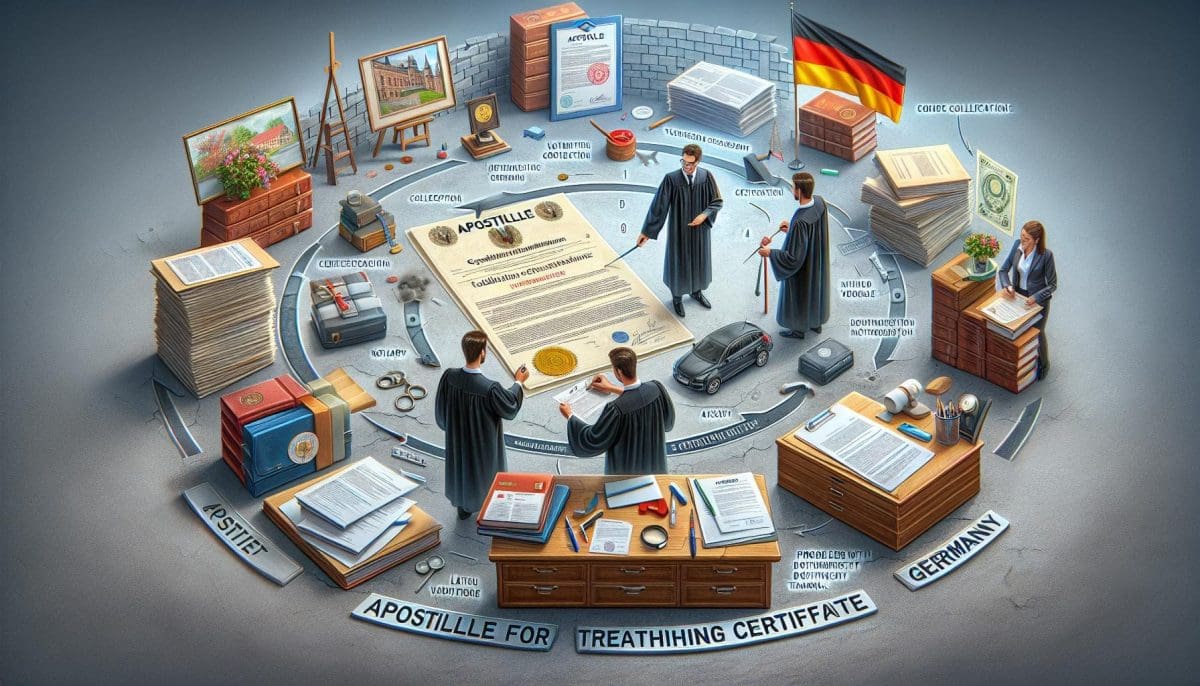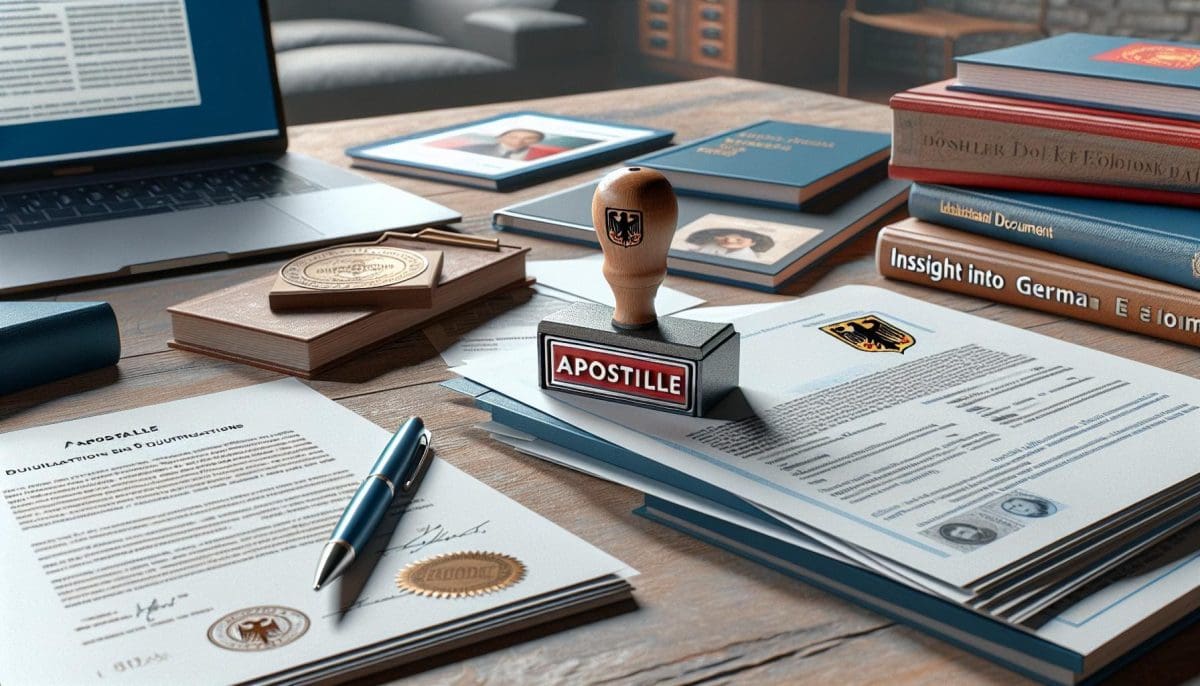Hey there, ready to dive into the wild world of document apostille services for your teaching certificates in Germany? Feeling a bit overwhelmed by all the bureaucratic hoops to jump through? Don’t worry, you’re not alone. Navigating the maze of legalization can be a real headache, but fear not – I’ve got your back!
In this blog post, I’m here to be your guide, your confidante, and your go-to source for all things apostille-related. No need to stress about confusing jargon or endless Google searches. I’m here to break it all down for you in a way that’s clear, concise, and dare I say, even a little entertaining.
Understanding Teaching Certificates Apostille Services for Germany
What Is Teaching Certificates Apostille in Germany?
Why, hello there, curious mind! Teaching Certificates Apostille may sound like a mouthful, but fear not! It’s simply a fancy way of saying your teaching qualifications need an official stamp of approval. So, when you see that shiny Apostille attached, it’s like German authorities giving you the thumbs up, saying, “You’re good to go!”
Germany’s Requirement for Teaching Certificates Apostille Services
Let’s dive into the nitty-gritty, shall we? Germany plays by the rules and wants to ensure your teaching certificates are the real deal. They want to make sure your qualifications are legit, so having that Apostille is like showing them your credentials without breaking a sweat. It’s a little extra step, but hey, it’s all about making sure everything’s in order for your teaching endeavors in Germany.
Why Teaching Certificates Require Apostille for Use in Germany
Picture this: You’re all set to embark on your teaching journey in Germany, but wait, they need that Apostille on your certificates. Why, you ask? Well, it’s all about trust and credibility. Germany values authenticity and wants to be sure they can rely on your qualifications. So, with that Apostille in hand, you’re not just another teacher – you’re the real deal, ready to make an impact in the classroom.
The Apostille Process for Teaching Certificates in Germany


Step-by-Step Guide to Apostilling Teaching Certificates in Germany
So, you’ve got your teaching certificate and Germany is your next step. Time to dive into the apostille process. Start by contacting the relevant authorities in your country to verify and authenticate your documents. Once you have this green light, you’re ready to move on to the next stage.
In Germany, the apostille process involves submitting your teaching certificate to the designated government office for verification. Your document will receive an official stamp, affirming its authenticity. This stamp is the golden ticket that opens doors for you to teach in German classrooms confidently and legally.
Common Challenges and Solutions
Navigating the apostille process can be a bit like finding your way through a maze. But fear not! Common challenges like document errors or incomplete information are nothing new. Stay on top of potential hiccups by ensuring all your paperwork is accurate and up-to-date. If any issues arise, don’t hesitate to reach out for assistance. Solutions are out there to smoothen your journey.
Necessary Documents for Teaching Certificates Apostille
When it comes to getting your teaching certificate apostilled for Germany, preparation is key. Gather your original certificate, a valid form of identification, and any additional supporting documents required. Having these essentials in order will help streamline the apostille process and get you one step closer to realizing your teaching ambitions in Germany.
Professional Apostille Services for Germany


Benefits of Using Professional Services for Germany
When it comes to getting your teaching certificates apostilled in Germany, opting for professional services can be a game-changer. Experienced apostille service providers bring a wealth of knowledge and expertise to the table, ensuring that the process is smooth and hassle-free for you. Say goodbye to navigating complex requirements on your own – with professionals by your side, you can relax knowing that your documents are in capable hands.
How to Choose a Reliable Apostille Service Provider for Germany
Selecting the right apostille service provider is crucial for a seamless experience. Look for providers with a proven track record in handling apostille services for educational documents. Customer reviews and testimonials can offer valuable insights into the quality of service you can expect. Additionally, make sure the provider offers timely and reliable communication throughout the apostille process, keeping you informed every step of the way.
What to Expect in Terms of Costs and Time Frame
Cost and time frame are important considerations when utilizing professional apostille services. While prices may vary depending on the provider, expect to pay a reasonable fee for the expertise and convenience provided. In terms of time frame, professional services can often expedite the apostille process, ensuring that you receive your certified documents within a prompt manner.
Legal Implications and International Laws


Understanding the Hague Apostille Convention
Wondering what this convention is all about? Well, it’s basically a global agreement that simplifies the process of certifying documents for international use. 93 countries are part of this game-changing pact, making your certificate validation a whole lot smoother.
Differences Between Apostille and Legalization
Apostille vs. legalization – what’s the deal? Simply put, apostille is like the trendy express lane for document authentication, while legalization takes the scenic route with embassy stamps and all that jazz. Depending on where you plan to teach, knowing the distinction can save you time and headaches.
Compliance with Chinese Laws and International Standards
China-bound with your teaching dreams? Make sure your documents play by the rules. Meeting Chinese laws and global standards is crucial for a hiccup-free journey. Whether it’s degree certificates, background checks, or applications, staying on the right side of the law is key.
Conclusion: Ensuring Success with Teaching Certificates Apostille Services in Germany


You’re all set to kickstart your teaching journey in Germany, armed with authenticated certificates thanks to the smooth-sailing Apostille process. By staying on top of the Hague Apostille Convention regulations, you’ve paved the way for a hassle-free transition into the German education system.
Things people don’t know about Teaching Certificates Apostille for Germany


So, you’re diving into the world of teaching certificates and Apostille services for Germany, but did you know there’s more to it than meets the eye? Let’s uncover some lesser-known tidbits that might just surprise you:
- Handwritten Signatures Matter: Yep, even in today’s digital age, Germany still values handwritten signatures on documents. It’s a touch of tradition that holds weight, so make sure your certificate is inked, not just typed.
- Time Is of the Essence: While you’re busy prepping for your big move, remember that the Apostille process can take time. Don’t leave it to the last minute; plan ahead and avoid unnecessary stress.
- Not All Certificates Are Created Equal: Each country has its own set of rules and regulations for teaching certificates. Make sure yours meets Germany’s standards to sail smoothly through the Apostille process.
- Translation Troubles?: If your certificate isn’t in German, you’ll need an accurate translation to go along with it. A mistranslation could mean delays, so double-check for accuracy.
- Apostille All the Way: Skipping the Apostille step might seem tempting, but it’s a crucial requirement for your certificate to be recognized in Germany. Don’t cut corners when it comes to validation.
- Keep Copies Close: In the whirlwind of moving abroad, it’s easy to misplace important documents. Make copies of your Apostilled teaching certificate and keep them safe for any future needs.
- Hague Apostille Convention: Understanding the ins and outs of the Hague Apostille Convention can demystify the process for you. Familiarize yourself with its principles to navigate the Apostille journey confidently.
History of Teaching Certificates Apostille for Germany
Let’s take a trip down the memory lane of Teaching Certificates Apostille for Germany. Understanding the roots can sometimes shed light on the present process. Wouldn’t you agree?
- 1975: The Hague Apostille Convention came into force, simplifying document authentication across borders.
- Germany: Adopted the convention in 1966 to streamline the validation of foreign educational documents.
- Teaching Certificates: Hold a special place, requiring rigorous verification to meet Germany’s standards.
These historical milestones paved the way for today’s smoother Apostille journey. Fascinating, isn’t it?
Stats and Facts About Teaching Certificates Apostille for Germany
Hey there, savvy educators and globetrotters! Curious about the nitty-gritty of Teaching Certificates Apostille for Germany? Let’s sprinkle some knowledge on this hot topic:
Quick Overview
Here’s a snapshot of the essentials:
| Key Data | Numbers |
|---|---|
| Total Member Countries of The Hague Apostille Convention | 118 |
| Year Germany Joined the Convention | 1966 |
| Average Processing Time for Teaching Certificate Apostille | 5-7 Business Days |
Fun Fact Blitz
- Germany has been rocking the Apostille game since the swinging sixties!
- Getting your hands on that coveted Apostille for your teaching certificate takes an average of 5-7 business days – time to grab a coffee and chill!
- With 118 member countries in The Hague Apostille Convention, your document is getting some serious global street cred!
- Teaching certificates undergo rigorous scrutiny to meet Germany’s high standards – no shortcuts here!
- Need that shiny Apostille? Trust the process and kick back while the experts do the heavy lifting!
- Stay in the loop with the requirements and watch those Apostille worries melt away like ice cream on a summer day!
Related Topics to Teaching Certificates Apostille for Germany
So, you’ve wrapped your head around the nitty-gritty of Teaching Certificates Apostille for Germany – kudos to you! But guess what? There’s more to explore in this fascinating realm. Dive into these related topics that’ll broaden your understanding and keep you ahead of the game:
- Educational Qualification Evaluation: Ever pondered how your teaching credentials stack up internationally? Unravel the mysteries of educational qualification evaluation services to uncover the equivalence of your qualifications in the global arena.
- Visa Application Procedures: Ready to jet off to Germany for your teaching adventure? Delve into the ins and outs of visa application procedures for educators. Get a sneak peek into the visa requirements and processes that pave the way for your overseas teaching stint.
- Language Proficiency Tests: Language is your ally in the classroom, and mastering the local lingo can work wonders for your teaching journey. Explore the significance of language proficiency tests, such as the TestDaF or DSH, in proving your language prowess to German authorities.
- Cultural Integration Tips: Teaching abroad is not just about lesson plans and chalkboards; it’s about immersing yourself in a new culture. Unearth valuable insights and cultural integration tips to navigate the nuances of living and working in Germany seamlessly.
What People Say About Teaching Certificates Apostille for Germany
So, you’re diving into the world of Teaching Certificates Apostille for Germany. It’s natural to wonder what others are saying about this process. Let’s tune in to the buzz:
- Embrace the simplicity. People rave about how straightforward the apostille service is for their teaching certificates bound for Germany.
- Relief all around! Many share how time-saving it is to have their documents apostilled hassle-free.
- No more second-guessing. The peace of mind that comes with having a properly apostilled teaching certificate is priceless.
You’re not alone in this journey. Let these testimonials guide you through the smooth sailing ahead.
Teaching Certificates Apostille for Germany Subtopics
Let’s zoom in on the nitty-gritty details that can make or break your teaching aspirations in Germany. Buckle up for a whirlwind tour of crucial subtopics that’ll have you prepped and primed for success:
- Document Authentication Basics: Uncover the essential steps to having your teaching certificates officially recognized in Germany through the apostille process.
- Apostille Requirements Demystified: Navigate the maze of requirements and documentation needed to ensure a smooth and hassle-free apostille for your teaching certificates.
- Cost Considerations: Delve into the financial side of apostille services and gain insights into the costs involved in authenticating your teaching certificates for Germany.
- Processing Time: Time is of the essence! Explore the expected processing times for apostille services to get a handle on when you can expect your documents to be ready.
- Handling Delays: Anticipate potential roadblocks and discover strategies to tackle unexpected delays in the apostille process for your teaching certificates.
- Choosing a Reliable Service Provider: Not all apostille services are created equal. Arm yourself with tips on selecting a trustworthy and efficient service provider for your document authentication needs.
- Verification Protocols: Once apostilled, what’s next? Unpack the nuances of document verification processes to ensure a seamless transition into the German education system.
Define Teaching Certificates Apostille for Germany
So, you’re gearing up for an adventure in Germany, armed with your teaching certificates. But hold up—before you jet off, let’s chat about the nitty-gritty of getting these crucial documents all dolled up for their German debut.
What’s the Deal with Apostille?
Picture this: an Apostille is like the fancy stamp that adds a hefty dose of credibility to your teaching certificates. It’s not just any stamp, mind you—it’s the golden ticket that turns your documents into superstar proof of your qualifications.
The German Connection
Teaching Certificates Apostille for Germany? It’s the key that unlocks the door to your teaching dreams in this beautiful country. Without it, well, let’s just say you might hit a few roadblocks on your path to becoming an educator extraordinaire in Germany.
Breaking it Down
Here’s the lowdown: an apostilled teaching certificate tells the German authorities, “Hey, this document is legit! This person is the real deal!” It’s like vouching for yourself without saying a word—all thanks to that magical Apostille.
Why Bother?
You might wonder, “Do I really need to go through all this hassle?” Short answer: yes. Think of it as your golden ticket (or should we say, golden stamp?) to a smoother, hassle-free journey as you navigate the intricate world of international teaching.
Fact Check
Let’s glance at some key stats:
| Apostilled Teaching Certificates for Germany |
|---|
| Over 300,000 international educators |
| applied for teaching positions in Germany last year |
Teaching Certificates Apostille Glossary
Hey there, fellow jet-setter! Ready to dive into the world of Teaching Certificates Apostille lingo? Let’s break it down for you in a way that won’t have you scratching your head.
- Apostille: It’s like the golden stamp that gives your teaching certificate a thumbs-up for international use. Think of it as your passport to teaching abroad, especially in a country like Germany.
- Authentication: This is the official seal of approval that verifies your teaching certificate as legit. No more doubters or skeptics—it’s the real deal!
- Legalization: This step ensures that your teaching certificate complies with the legal requirements of the country where you plan to teach. It’s like crossing your T’s and dotting your I’s.
- Notary Public: This trustworthy individual plays a key role in the apostille process, certifying the authenticity of your documents. They’re the unsung heroes of the paperwork world.
- Foreign Credential Evaluation: This assessment determines the equivalency of your teaching qualifications in another country. It’s like a translation service, but for your educational background.
- Teaching Abroad: The dream destination for educators seeking new horizons. Imagine sharing your knowledge and skills in a global classroom—exciting, right?
- Teaching Positions in Germany: A hotspot for international educators looking to broaden their teaching experience. With the demand for qualified teachers on the rise, Germany beckons with open arms.
There you have it—Teaching Certificates Apostille terminology made simple! Stay tuned for more insights and tips to ace your teaching adventures abroad.
Who Should Use Teaching Certificates Apostille for Germany?
So, who really benefits from getting their Teaching Certificates apostilled for Germany? Let’s break it down for you:
- Educators: If you’re a teacher eyeing that dream job in Germany, apostilling your teaching certificates is a must. It’s your ticket to unlocking opportunities in the German education sector.
- Aspiring Teachers: Thinking of pursuing a teaching career in Germany? Apostilling your teaching certificates sets you on the right path from the get-go.
- Educational Professionals: Whether you’re a school administrator, education consultant, or curriculum specialist, having apostilled teaching certificates ensures you’re prepared for any international ventures.
- Language Instructors: Planning to teach English or any other language in Germany? Apostille your certificates to showcase your qualifications with confidence.
- Experienced Teachers: Even if you’ve been in the teaching game for years, apostilling your certificates opens doors to explore teaching positions in Germany and beyond.
Remember, apostilling your teaching certificates could be the game-changer you’ve been looking for.
Pros and Cons of Teaching Certificates Apostille for Germany
So, you’re eyeing that teaching gig in Germany? Considering getting your Teaching Certificates Apostille? Let’s break down the pros and cons, friend!
Pros:
- Global Recognition: Apostilling your teaching certificates can open doors not just in Germany but worldwide. It’s like having a golden ticket that says, “I’m qualified, no matter where I go.”
- Career Advancement: With an apostilled certificate, you’re signaling to potential employers that you’ve gone the extra mile. It could give you a leg up in the competitive field of education.
- Smooth Process: Once you have that apostille, navigating international bureaucracy becomes a breeze. No more headaches or delays when applying for teaching positions abroad.
- Cost Factor: Depending on where you are, getting your certificates apostilled can come with a price tag. It’s an investment in your future, but one that might require some financial planning.
- Time-Consuming: The apostille process can take time, especially if you’re dealing with multiple certificates or documents. Patience is key as you go through the necessary steps.
- Not Always Required: While apostilling can boost your credentials, remember that not every country or institution may demand it. It’s essential to research and see if it’s a must-have for your specific situation.
So, there you have it! A glimpse into the world of Teaching Certificates Apostille for Germany. weigh your options, consider your goals, and make the choice that aligns best with your career aspirations.
Things to Consider About Teaching Certificates Apostille for Germany
So, you’re eyeing that dream job teaching abroad in Germany? Smart move! But before you pack your bags and pull out the lederhosen, let’s chat about getting your teaching certificates apostilled. Here are some key things to ponder:
- International Recognition: An apostille on your teaching certificates is like a stamp of approval recognized globally. It opens doors to teaching gigs in Germany and beyond, making your qualifications shine bright.
- Career Growth: Picture this – with an apostilled teaching certificate, you’re a hot commodity in the international education scene. Say goodbye to career stagnation and hello to exciting opportunities.
- Validity Period: Keep in mind that an apostille doesn’t last forever. It’s valid for a set period, so timing is crucial. Plan ahead and make sure your documents are up to date.
- Cost Factor: Let’s talk turkey – getting your teaching certificates apostilled comes with a price tag. Consider it an investment in your future career prospects. Quality education is always worth it, right?
- Time Investment: Apostilling your documents isn’t an overnight affair. It takes time and a bit of paperwork wrangling. So, roll up your sleeves, set aside some time, and get ready to tackle the process like a champ.
Common Problems With Teaching Certificates Apostille for Germany
Ensuring your teaching certificates are apostilled for Germany is crucial for your international career prospects. By obtaining this certification, you open doors to teaching opportunities not only in Germany but also worldwide. Remember, the apostilling process requires careful attention to detail and can be time-consuming and costly. Proper planning and preparation are key to successfully navigating this procedure. Stay informed about the requirements and benefits of apostilling your teaching certificates to set yourself up for a successful teaching career abroad.
Frequently Asked Questions
What are the benefits of obtaining Teaching Certificates Apostille for Germany?
Obtaining Teaching Certificates Apostille for Germany offers international recognition and enhances career growth opportunities, especially for those seeking teaching roles in Germany and other countries.
What are the considerations individuals should keep in mind when apostilling teaching certificates?
Individuals should carefully plan and prepare for the time and cost investment required for the apostilling process. It is essential to navigate the procedure successfully to ensure the teaching certificates are recognized internationally.
Why is apostilling teaching certificates important for those seeking teaching opportunities abroad?
Apostilling teaching certificates is crucial for individuals aiming to teach abroad as it validates the authenticity of their qualifications and facilitates a smoother recognition process in foreign countries.

